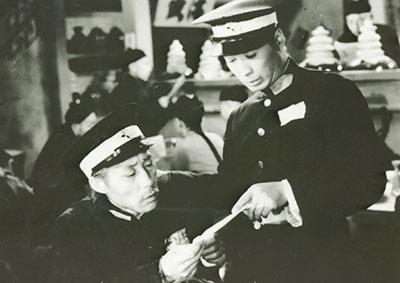Directed by Shi Hui
"Shi Hui, driven to suicide in Mao's 'Anti-Rightist Purge' of the late 1950s, was one of the greatest screen actors ever and a very fine director; this adaptation of a short story by Lao She was probably his best work" (Tony Rayns, Time Out London). The first film produced in Shanghai after the end of the civil war, This Life of Mine delicately balances the interest in earthy local language that was a hallmark of the May 4th Movement with the class analysis demanded by the new regime. It is also among the first fully realized examples of Soviet-influenced cinematography in Chinese cinema: the film's sublime play of light and shadow was much admired and frequently imitated in the years to come. The film traces the history of 20th-century China from the fall of the Qing dynasty through to the 1949 Revolution through the eyes of a simple Beijing policeman, played by actor-director Shi Hui, who brilliantly conveys the changing face of the Chinese people through four tumultuous decades of conflict. "The ultimate discovery. As an expression of the New China's spiritual turmoil, the film engages in intense moral inquiries and ambiguities that are unparalleled in socialist cinema, even as it tries to toe the party line" (Andrew Chan, The L Magazine).
Wenhua Film Company. Screenwriter: Yang Liuqing, based on the story by Lao She. Cinematographer: Lin Fa, Ge Weiqing. Editor: Fu Jiqiu. Cast: Shi Hui, Li Wei, Wei Heling, Wang Min, Cui Chaoming.
35mm, b/w, in Mandarin with English subtitles, 120 min.






 Mobile Navigation
Mobile Navigation

